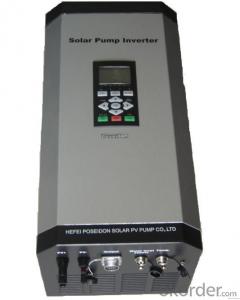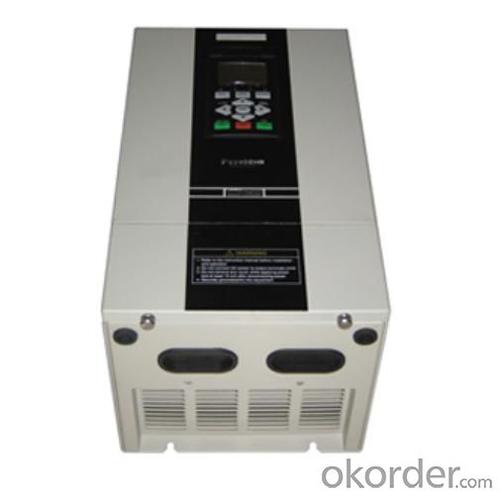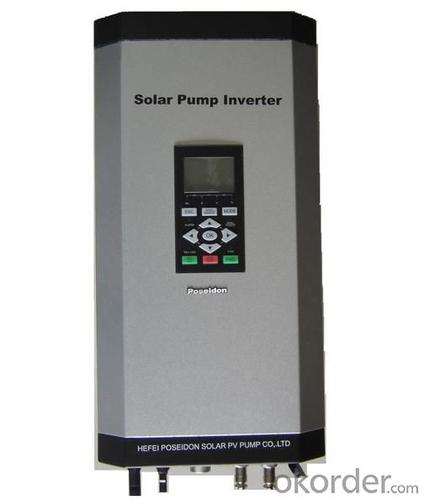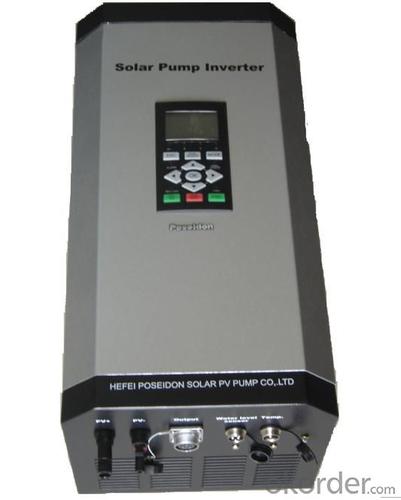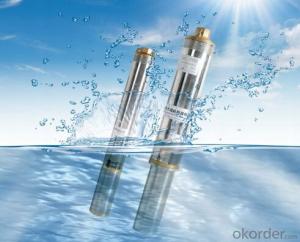Solar Pump for Water Fountain FCPM15KH Inverter
- Loading Port:
- China Main Port
- Payment Terms:
- TT OR LC
- Min Order Qty:
- -
- Supply Capability:
- -
OKorder Service Pledge
Quality Product, Order Online Tracking, Timely Delivery
OKorder Financial Service
Credit Rating, Credit Services, Credit Purchasing
You Might Also Like
Solar pump inverter FCPM15KH Product Description:
Solar water pumping system is constructed with solar panel array,solar pump inverter and AC water pump, DC current produced from solar panel will be delivered to solar pump inverter,and it will convert it into AC current to drive water pump,and will automatically regulate output frequency according to sun radiance intensity,maximally realize MPPT tracking function.
Features
Adopting the proposed dynamic VI maximum power point tracking (MPPT) control method, with fast response, and reliable operation, achieves efficiency of 99%.
Designed with variable frequency driver, greatly improves efficiency
Extremely high efficiency
Digital mode control, with automatic operation and manual operation mode options
Complete protection functions
Adopts intelligent IPM module, with high reliability
LCD display and operation panel, in real time presents operating data
Optional for water level measurement and control circuit
Applicable for general ACC pumps, like centrifugal pump, piston pump etc.
Independent intellectual property; Highly effective, the redundant reliability, exempts the maintenance and the long life.
The pumps are soft started, fully protected.
No batteries are used. So better Sunlight, more water.
Datasheet.
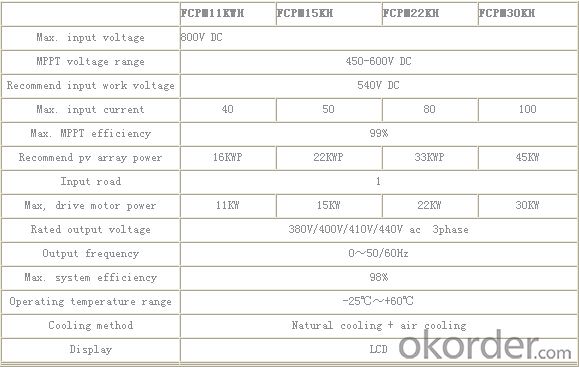
- Q: Can a solar pump be used for both irrigation and drinking water purposes?
- Yes, a solar pump can be used for both irrigation and drinking water purposes. Solar pumps are designed to draw water from a source, such as a well or a river, using solar energy instead of traditional power sources. The water can then be used for various purposes, including irrigation for agricultural fields and gardens, as well as for drinking water purposes. However, it is important to note that the water should be properly treated and filtered before it is used for drinking to ensure its safety and to remove any impurities. Additionally, the capacity and specifications of the solar pump should be considered to determine if it can meet the required water demands for both irrigation and drinking water purposes.
- Q: How does the quality of the solar panels affect the performance of a solar pump system?
- The performance of a solar pump system greatly depends on the quality of the solar panels. Solar panels of high quality are designed to efficiently convert sunlight into electricity, resulting in maximum power output. When the solar panels are of good quality, they are able to capture solar energy more effectively, leading to higher electricity production. As a result, a solar pump system with high-quality panels can generate more power, meeting the water pumping requirements and providing a greater amount of energy. On the other hand, low-quality solar panels may have lower conversion efficiency, resulting in reduced power generation. This directly affects the performance of the solar pump system as the lower power output may not be enough to operate the pump effectively or meet the desired water pumping needs. Additionally, it is important to consider the durability and reliability of the solar panels. High-quality panels are made with superior materials and can withstand harsh weather conditions and environmental factors. They have a longer lifespan and consistently perform well. In contrast, low-quality panels are more prone to damage and degradation, leading to decreased power output and a shorter lifespan. Furthermore, the quality of solar panels also impacts the overall system efficiency and maintenance requirements. High-quality panels often have advanced features such as anti-reflective coatings and self-cleaning mechanisms. These features enhance energy absorption and reduce the accumulation of dust and dirt. As a result, the panels operate at their maximum efficiency and require less frequent cleaning and maintenance. In conclusion, investing in high-quality solar panels is crucial to optimize the performance of a solar pump system. It ensures maximum power output, durability, and reliability, leading to efficient water pumping operations and long-term cost savings.
- Q: What size solar pump do I need for my application?
- The size of the solar pump you need for your application depends on various factors such as the desired flow rate, total dynamic head, and the specific requirements of your application. It is recommended to consult with a solar pump supplier or an expert in the field who can evaluate your needs and provide you with the appropriate sizing recommendation.
- Q: How does the cost of a solar pump compare to a diesel or electric pump?
- The cost of a solar pump compared to a diesel or electric pump can vary depending on several factors. In terms of upfront costs, a solar pump generally has a higher initial investment compared to a diesel or electric pump. This is because a solar pump requires the installation of solar panels, inverters, and batteries to harness and store solar energy. These additional components can increase the overall cost of the system. However, when considering the long-term operational costs, a solar pump is significantly more cost-effective. Solar energy is free and abundant, which means there are no fuel costs associated with running a solar pump. On the other hand, diesel pumps require regular fuel refills, and electric pumps are connected to the grid, which means ongoing electricity bills. Moreover, solar pumps have lower maintenance costs compared to diesel or electric pumps. Diesel pumps require frequent maintenance to ensure proper functioning, such as oil changes, filter replacements, and regular engine maintenance. Electric pumps may also require maintenance and repairs due to electrical faults or grid outages. In contrast, solar pumps have relatively fewer moving parts, making them more reliable and requiring less maintenance. Additionally, solar pumps are environmentally friendly as they produce zero greenhouse gas emissions during operation, whereas diesel pumps contribute to air pollution and carbon emissions. Electric pumps, although cleaner, still rely on electricity generated from various sources, some of which may involve carbon-intensive methods. It is important to note that the cost comparison between these types of pumps may vary depending on factors such as the size of the system, location, local energy prices, and the availability of sunlight. In some cases, government incentives or subsidies for renewable energy technologies may also affect the cost comparison. Overall, while the upfront cost of a solar pump may be higher, its lower operational and maintenance costs, as well as its environmental benefits, make it a more cost-effective and sustainable choice in the long run compared to diesel or electric pumps.
- Q: Is a solar pump easy to install?
- Yes, a solar pump is generally easy to install. It does not require complicated wiring or extensive plumbing work. The installation process involves mounting the solar panel and connecting it to the pump using simple connectors. Additionally, there is no need for an external power source, making it a convenient and hassle-free installation.
- Q: What is the warranty period for a solar pump system?
- The warranty period for a solar pump system can vary depending on the manufacturer and the specific product. Generally, most reputable manufacturers offer a warranty period ranging from 1 to 5 years. During this period, if any defects or malfunctions occur in the solar pump system, the manufacturer will repair or replace the product free of charge. It is important to carefully review the warranty terms and conditions provided by the manufacturer before purchasing a solar pump system, as some warranties may have certain limitations or exclusions. Additionally, it is advisable to choose a solar pump system from a reliable manufacturer that provides good customer support and after-sales service to ensure a smooth warranty claim process, if needed.
- Q: Can a solar pump be used in conjunction with a storage system?
- Yes, a solar pump can be used in conjunction with a storage system. In fact, combining a solar pump with a storage system can offer several benefits. A storage system allows excess energy generated by the solar panels to be stored for later use, which can be particularly useful during periods of low sunlight or at night when the solar panels are not actively generating power. By connecting the solar pump to the storage system, the excess energy can be used to power the pump even when the sun is not shining. This ensures a continuous water supply, regardless of the time of day or weather conditions. Additionally, using a storage system with a solar pump can also help reduce the reliance on grid electricity, making it a more sustainable and cost-effective solution for water pumping needs.
- Q: How do I choose the right solar pump for my needs?
- To choose the right solar pump for your needs, you should consider factors such as the water flow rate required, the total dynamic head (TDH) or vertical distance the pump needs to lift the water, the availability of sunlight in your location, the size of your water source or well, and your budget. Determine your specific water pumping requirements and then compare different models based on their specifications, efficiency, and reliability. Additionally, consult with a solar pump expert or supplier who can provide guidance and help you select the most suitable option for your needs.
- Q: Can solar pumps be operated remotely or controlled through a smartphone app?
- Yes, solar pumps can be operated remotely or controlled through a smartphone app. With the advancement in technology, solar pumps can be equipped with remote monitoring and control capabilities. This allows users to conveniently operate and monitor the pump's performance from anywhere using a smartphone app.
- Q: Can a solar pump be used in conjunction with a battery backup system?
- Yes, a solar pump can be used in conjunction with a battery backup system. The solar panels will generate power during the day, which can be used to directly power the pump or charge the batteries. The battery backup system will store excess power generated by the solar panels, allowing the pump to continue operating during periods of low sunlight or at night.
Send your message to us
Solar Pump for Water Fountain FCPM15KH Inverter
- Loading Port:
- China Main Port
- Payment Terms:
- TT OR LC
- Min Order Qty:
- -
- Supply Capability:
- -
OKorder Service Pledge
Quality Product, Order Online Tracking, Timely Delivery
OKorder Financial Service
Credit Rating, Credit Services, Credit Purchasing
Similar products
Hot products
Hot Searches
Related keywords


